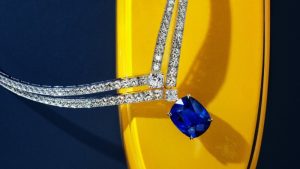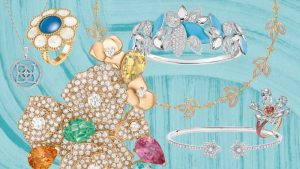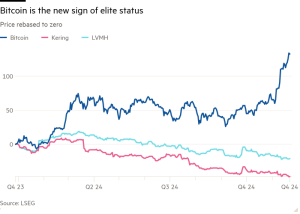A slow-living retreat in the Burren
Unlock the Editor’s Digest for free
Roula Khalaf, Editor of the FT, selects her favourite stories in this weekly newsletter.
The Burren in County Clare is a landscape unlike any other. The chalky grey karst topography was formed beneath the sea then thrust upward, sculpted by a collision of tectonic plates to form a lunar terrain of limestone that today supports a hugely diverse and unique ecosystem.
It is a solitary, starkly beautiful place, its effect to make the visitor pause. On the top of a plateau, along a craggy, winding road lined with handbuilt stone walls, a bright red gate marks the entrance to Summerage. This is a restored and revived 32-acre farmstead – a dedicated “slow-living” escape in the heart of the Burren.

Summerage is the third movement of a slow trilogy expressing the unique life view of founder Aoibheann MacNamara. In 2001 MacNamara opened Ard Bia café in her birthplace, the heritage town of Ardara, County Donegal, serving wholesome food with an edge. An avid traveller, she used local ingredients and introduced combinations and ideas garnered on her many travels. In 2003 she moved the café to Galway, where, under head chef Thomas Corrigan, it is an award-winning restaurant with a slow-food ethos. More than this, though, it is a cultural hub and a convivial place for the people of Galway to gather, eat and talk. She brought a different style of food to Galway and was in the vanguard of the city’s culinary revival. In 2014, MacNamara also started The Tweed Project, a slow fashion label using Irish tweed and linen, with her friend the costumier Triona Lillis. All its clothes are made in Galway.


The name, Summerage, is a play on the ancient traditional movement of livestock, unique to the Burren, called winterage. Contrary to the transhumance in many countries, Burren farmers move cattle up from the greener lowlands to the karst hills for winter. Here the limestone, acting like a giant storage heater, keeps the cattle warm, and in turn they enjoy a symbiotic relationship with the land, clearing the shrubs and allowing space and light for the diverse flora of more than 1,100 species to grow.
MacNamara has connected with a community of like-minded people – teachers, farmers, gardeners and artisan builders – who have come together to revive Summerage. Mark Earley from OpenHive has created the wild Irish honeybee apiary. The Gáirdín Bia (food garden) supplements the kitchen at Ard Bia with vegetables and is cared for by Ciara Parsons, a teacher at the nearby Common Knowledge build school. MacNamara has given her grazing to a local farmer (who is also her stonemason) for winterage.

She now has a new oak forest growing in the valley below the plateau as part of a carbon-offset programme (Catch My Carbon) and works closely with Burrenbeo Trust and Seed Savers on biodiversity. “It is important to do things correctly,” she says, “the way it was done in the past, the way it worked best.” With no mains, rainwater harvesting is essential, although she has tapped a spring in a limestone fissure for freshwater that fills tanks in one of the outhouses. The valley is also home to a large hazel copse that grows through and around 19th-century famine-cottage ruins. Here there is a completely different climate, and when the wind howls on the plateau, the valley remains calm and protected.
The cottage on the plateau is a conversion of an original farmhouse and has been designed by eco architect Mike Haslam of Haslam & Co with both a traditional and contemporary feel. Its Icelandic-feeling red roof takes on a modern slant with the lime-rendered dark-grey walls, somewhat inspired by the tar houses of Dungeness.


The interiors are cosy and pared back with pops of red and yellow. “I have been hugely inspired by my friend Irenie Cossey, an Irish designer based in London at Irenie Studio. Her bold use of colour and incredible understanding of interior design and structure have given me the confidence to be bolder – bolder than usual,” she laughs. “Le Corbusier too has been an inspiration; I love his reds and yellows, but not so much his greens and blues.” Hints of modernism are visible in furniture such as Vitra’s Eames chairs in wire. Marseille’s Maison Empereur has been the source of many household items such as linens and kitchen knives.

When I ask MacNamara what she wants Summerage to offer, she says: “I would like it to be a place for people to retreat into themselves. Lots of places offer things to do such as forest bathing, yoga etc. External things, for busy people that just can’t stop, so they continue to be busy. It’s not like that here.”
She explains: “As I get older, I want super-simplicity in my travel. I want space, the opportunity to really pull back from my life and come down. The main thing is that visitors [it sleeps four] will have 32 acres to be on their own, they will have complete exclusivity, nobody will come in apart from the beekeeper maybe once a month.


“People can stock up on good food at the local market in Ennistymon, sourdough in Hugo’s bakery in Lahinch and oysters from the Flaggy Shore [of the Seamus Heaney poem “Postscript”]. They can pick vegetables from the garden if they like, and enjoy the labour of cooking. We will have small jobs for them like tending the garden, if they feel like it, sort of the Buddhist way, and if you don’t, that’s fine too.”

As we sit in the greenhouse with the door open and a chill outside, drops of condensation fall on the tomatoes, causing MacNamara to smile. This is a place to amble, stand in the soft rain, lean into the wind, pause and notice. To sit by the stove, read a book, or not, and feel your presence in the world.
Summerage is available for weekly letting from 4 November, ardbia.com
#slowliving #retreat #Burren







